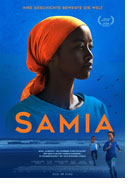

Opening 19 Sep 2024
Directed by:
Yasemin Samdereli
Writing credits:
Yasemin Samdereli, Nesrin Samdereli, Giuseppe Catozzella
Principal actors:
llham Mohamed Osman, Elmi Rashid Elmi, Fatah Ghedi, Mohamed Omar
Samia probes into a family’s choices, fears, influences within relationships, and dreams that fluctuate tightly against the realities of and repercussions from events outside their control. Based on Giuseppe Catozzella’s 2014 inspiring, coming-of-age novel, Don't Tell Me You're Afraid, writer-director Yasemin Şamdereli, with Nesrin Şamdereli’s co-written screenplay in collaboration with Deka Mohamed Osman, crafts a beautifully executed, unforgettable yet disconcerting voyage into a pertinent global actuality. The unimaginable obstacles people overcome pervade this powerful, moving cinematic interpretation of a remarkable story.
Since forever, Samia (Riyan Roble) and Ali (Zakaria Mohamed) are closer than brother and sister. As kids he tells her uncomfortable truths, while she admits wanting to be able to run free like boys. Recognizing their strengths and limitations, they make a lifelong pact. The families shared compound in Mogadishu, Somalia, is lively and loving. Her mother Ayaan (Fathia Mohamed Absie) watches over the clan with a sharp eye, just as her father Yusef (Fatah Ghedi) and Ali’s Yassin-Ahmed (Armaan Haggio) work together: the brothers are close. Winning the town race encourages the youngsters; their risks increase as the face of the revolutionaries change, becoming meaner, uglier, malicious, mendacious. Still, Samia (llham Mohamed Osman) keeps training and Ali (Elmi Rashid Elmi) helps dodge harassment from militant and insurgent groups. Samia starts wearing the hajib whenever she leaves their compound. When the Somalian Olympic committee sponsor the seventeen-year-old at her first games in 2008, Samia widens her lens and sets sight on the Olympics four years hence in London.
In 1960, the Republic of Somalia was formed; in 1969, following a military coup M. Siad Barre, as president, held dictatorial rule over the clan-based and predominantly nomadic country until 1991. Since then, a ferocious, bloody civil war and de facto governments have all but ruined the country causing a diaspora of its citizens.
Against this backdrop, the young girl turned woman obstinately nourishes her dream and goal that Osman portrays brilliantly, boldly, and poignantly with the strong supporting cast. Editors Mechthild Barth and Sebastian Bonde intricately and judiciously weave Florian Berutti’s cinematography, archival footage, and Rodrigo D'Erasmo’s expressive music to create an atmospheric backdrop while expanding inherent, obscure boundaries within the narrative. (Marinell Haegelin)